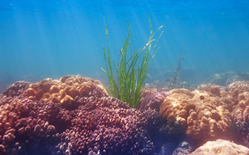Recent News & Events
Coral and Seaweeds Found to Alter Microbial Composition of Tropical Reefs
20

A team of biologists from San Diego State University discovered that corals and seaweeds have the ability to choose the types of bacteria present among the waters of tropical reef. The research was reported in the Proceedings of the National Academy of Sciences.
Headed by microbial ecologist Linda Kelly, the team collected and examined water microbes above 22 coral reefs. It is a well-known fact among scientists that seaweed and algae can easily envelop slow-growing corals. However, they were surprised to learn that the struggle had posed more effect on the surrounding ocean bacteria. It has always been a scientific suspicion that nutrient concentrations and water quality are the determinants for microbial existence around a reef.
Deep ocean was proven to have more nutrients such as inorganic nitrogen and phosphate as it is located near the equator. Kelly and her team predicted that there might be more undiscovered various microbes in reefs far from the equator. This was tested in the 11 atolls and coral islands of the Line Islands located at the south of Hawaii about 18 degrees of latitude across the equator. Researchers learned that the nutrient composition and latitude played minor roles in the determination of microbial content. Reefs were overly dominated by either corals or seaweed that showed the biggest factor in the quantity of microbes. Results of the observation concluded that less microbes were found above seaweed-rich reefs rather than in coral-dominated reefs.
Bacteria such as Gammaproteobacteria and Betaproteobacteria propagated in seaweed-dominated reefs whereas Alphaproteobacteria, Cyanobacteria and Firmicutes strive in coral-rich reefs. The bacteria found in the coral-rich reefs were found to have different genes according to the water’s nutrient. Bacteria present in waters rich with nutrient contain more nutrient-processing genes which can aid in resisting the damaging effects of cadmium, cobalt and zinc. On the other hand, bacteria found in water with poor nutrients were observed to have genes that allow for photosynthesis, making it possible for the bacteria to create their own food.
Another factor to consider in determining tropical reef water microbial content is the fishermen that collects fish with seaweed diets. With the onset of algae formation, the algae could interfere with the microbes in the water that lets the bacteria to infest corals.
Studies on life sciences such as water microbial composition require expert quality life sciences laboratory equipment to produce accurate and reproducible results that can pave the way for more biological discoveries and solutions in the near future.
Discovery Scientific Solutions (DSS) offers a vast selection of top quality life sciences laboratory products that suit the needs of every life sciences application.
